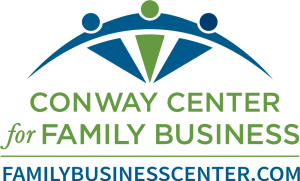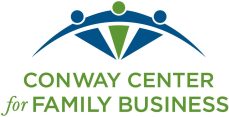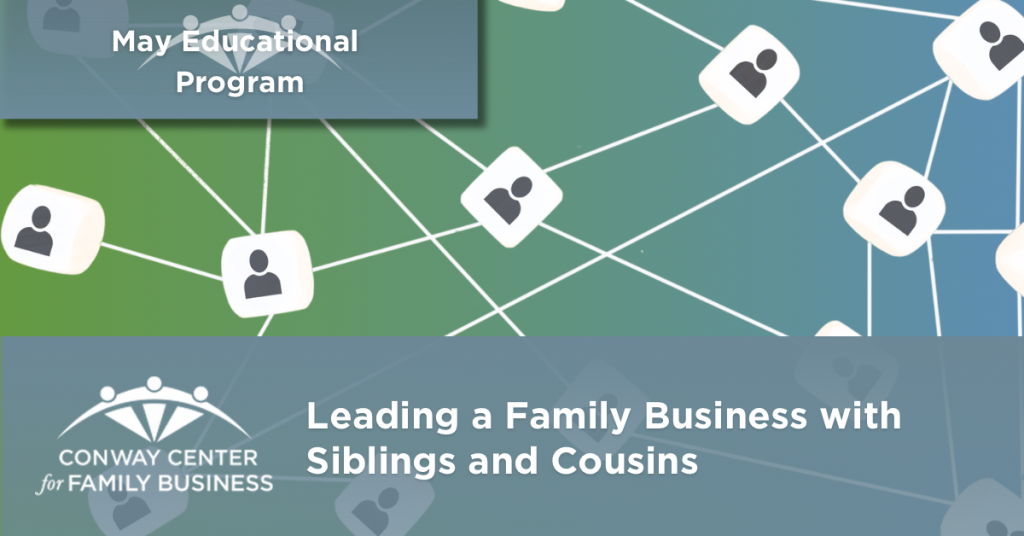At the May Monthly Educational Program: Leading a Family Business with Siblings and Cousins, Becky Fromkes, Professional Implementer with EOS Worldwide, facilitated a dynamic and insightful conversation with siblings Jenny & David Jarvis of Jendco Safety Supply and brothers Adam and Eric Stolly, and their cousin Joel Stolly of Stolly Insurance Agency. The panelists shared candid experiences about navigating leadership, communication, and decision-making within their multigenerational family businesses. Their stories highlighted the rewards and challenges of working together, offering valuable lessons for those in similar situations. Here are a few key takeaways for leading a family business with siblings and cousins.
Maintaining Relationships
In any family business, maintaining strong relationships outside of work is just as important as professional collaboration within it. Taking time to separate time for a personal family relationship is vital when working closely with siblings and cousins. Keeping business dynamics separate from personal interactions, especially during family gatherings, helps preserve the integrity of personal relationships. Advice provided in the discussion was to ensure you’re fighting for the same goals rather than the same roles. This can be achieved through clearly defined responsibilities and open communication. Regular alignment meetings can help ensure everyone is on the same page and can voice concerns or ideas constructively. Trust is the foundation of any successful collaboration, including trusting each family member to manage their responsibilities. By focusing on your contributions and maintaining mutual respect, family members can foster a healthier, more effective working environment.
The Business as a Part of The Family
The business is an integral part of the family dynamic and should feel like a part of the family. Integrating non-family employees into the “family” culture of the business is essential for building a cohesive and motivated team. By treating employees as extensions of the family, businesses can foster a sense of shared commitment to long-term success. When non-family members feel valued, it strengthens the overall culture and enhances collaboration across all levels of the organization. Working with siblings and cousins can lead to certain biases, which must be accounted for to ensure a positive dynamic for these non-family employees. A family business, at its best, has the unique ability to bring people closer together, not only within the family but across the entire company, by creating shared visions, common goals, and a sense of purpose that goes beyond profits. This inclusive, values-driven environment can become a powerful force that unites everyone involved.
Always Putting Family First
As much as the business should feel like a part of the family, family needs to come first. This principle is a guiding light, reminding everyone that relationships should never be sacrificed for short-term gains. It’s essential to consider the roles of siblings and cousins who may not be directly involved in the business, ensuring they still feel valued and connected to the family’s broader journey. When bringing family members into the business, it’s not just about inclusion. Finding the right fit at the right time will strike a careful balance between opportunity and capability. Weekly meetings can act as a therapeutic space, offering a structured time for open dialogue, alignment, and reflection, which helps keep everyone grounded and moving forward together. Despite the inevitable challenges of running a business, maintaining strong, respectful family relationships must remain a top priority, ensuring that the business strengthens the family rather than dividing it.
 If you are interested in the next Monthly Educational Program, please join us on the third Thursday of every month, starting 9/18/2025! Take a look at more of our Family Business Insights.
If you are interested in the next Monthly Educational Program, please join us on the third Thursday of every month, starting 9/18/2025! Take a look at more of our Family Business Insights.

